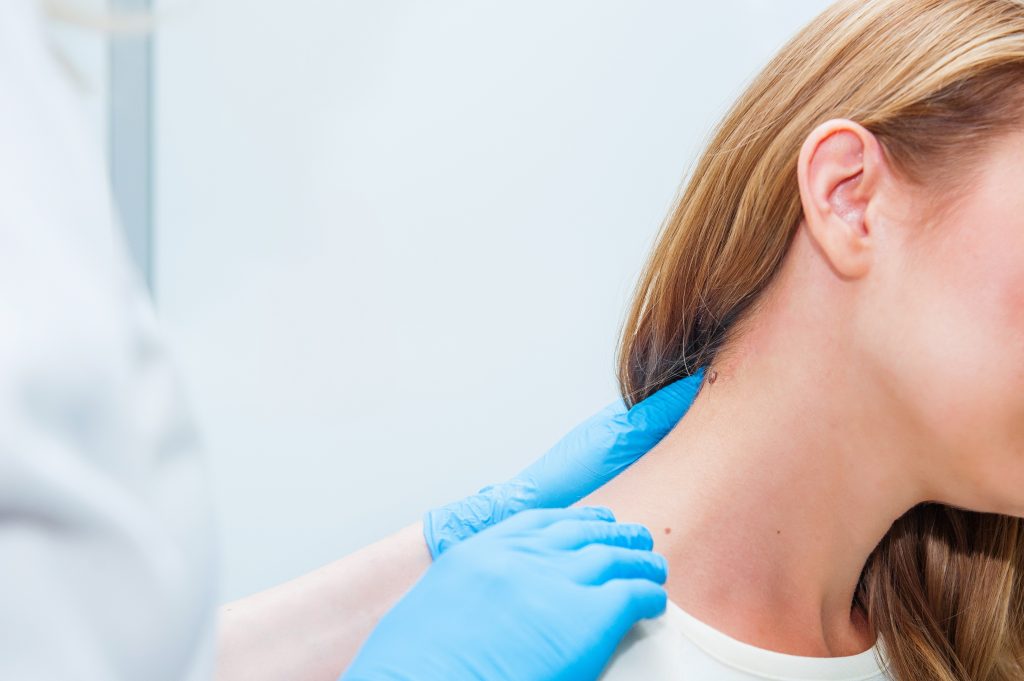
Our skin, the largest organ in our body, serves as a protective barrier against the external environment. It plays a crucial role in safeguarding our internal organs, regulating temperature, and providing sensory information. Despite its resilience, our skin is susceptible to various conditions, including skin cancers and other dermatological issues. Regular skin exams are a fundamental aspect of preventive health care, enabling early detection and intervention. In this blog, we’ll look into the significance of routine skin exams and how they contribute to overall well-being.
Here are five things you can expect at your next dermatology check-up.
1. Skin Cancer Exam
Skin cancer is the most common cancer in the United States, per the American Academy of Dermatology. Currently, it’s estimated that one in five Americans will develop skin cancer in their lifetime, and that approximately 9,500 Americans are diagnosed with new skin cancer every day. Basal cell and squamous cell carcinomas are the two most common types of skin cancer, and they are highly treatable if diagnosed early. Melanoma is the deadliest form of skin cancer, but it is also highly treatable if diagnosed before it spreads to the lymph nodes.
Early detection and treatment of all three forms of skin cancer is the most important reason why you should see your dermatologist for an annual check-up. If you have one or more risk factors for developing skin cancer, then you may consider seeing your dermatologist twice a year for screenings.
Risk factors include:
- Fair skin
- Light hair or eyes
- Multiple freckles, moles, or birthmarks
- Ability to sunburn easily
- History of using tanning beds
- Prior history of skin cancer lesion(s)
- Family history of skin cancer
- Time spent in a job or athletic activity that takes place outdoors
Skin cancer develops in people of all skin types and on all areas of the skin – even places that are not exposed to sunlight. At a skin screening, your dermatologist will scan your entire body to check for new moles, or moles and freckles that have irregular shapes, are large, are an unusual color, or have changed in appearance or size since your last appointment. The dermatologist’s screening will examine you in hard-to-see areas, or areas you may forget to check on your own – like between toes, soles of feet, scalp, in and behind ears, under fingernails, and in the groin area.
2. Full-Body Skin Assessment
In addition to providing a skin cancer exam, your dermatologist will assess your skin for other issues, like fungal or bacterial infections, benign skin growths, skin tags, and cysts. If you have acne, skin redness, or an inflammatory skin condition like eczema or psoriasis, your dermatologist will work with you to develop and maintain a treatment plan to keep your symptoms under control.
Your dermatologist can also be a great informational resource for any skin problems you notice throughout the year. He or she can help recommend products or skin care tips if you struggle with common problems like skin dryness or oiliness.
3. Nail and Hair Examination
Along with treating skin conditions, dermatologists are experts in treating nail and hair disorders. At an annual exam, your dermatologist will check the condition of your nails, as well as the health of your scalp and hair. Nail abnormalities are often an early sign of a medical problem elsewhere. If you are experiencing hair loss, talk to your dermatologist. He or she will diagnose your type of hair loss and create a treatment plan, if necessary.
4. Sun Damage Prevention
Prolonged exposure to the sun’s harmful ultraviolet (UV) rays is a major contributor to skin damage and premature aging. Routine skin exams can serve as a reminder to protect your skin from excessive sun exposure. This includes using sunscreen, wearing protective clothing, and seeking shade during peak sunlight hours. During your annual skin exam, your dermatologist can help direct you towards making the best sun-safe decisions for your skin.
5. Peace of Mind:
Regular skin exams empower individuals to take an active role in their health. By becoming familiar with their own skin and conducting self-exams, people can proactively monitor changes and seek medical attention when necessary. This sense of self-awareness fosters a preventive mindset, promoting overall well-being.
A routine skin exam not only provides physical health benefits but also offers peace of mind. Knowing that you are taking proactive steps to monitor and care for your skin can alleviate anxiety and stress related to potential skin issues. Prevention and early detection contribute to a sense of control over your health.
In between annual exams, you should perform regular self-checks on your skin. Keep track of new or changing marks and remember your ABCDE’s when it comes to potential skin cancer growths – asymmetry, border irregularity, color, diameter, and evolving size. You know your skin better than anyone, and according to the AAD, about half of all melanomas are self-detected.
The dedicated medical team at Florida Dermatology and Skin Cancer Centers are experts in the field of skin, hair, and nail conditions. Contact our office to schedule your next skin exam today!
Contact FLDSCC for All Your Skin Care Needs
Florida Dermatology and Skin Cancer Centers provides a full spectrum of dermatology and skin care services, and its team of physicians, APRNs, and PAs are experts in diagnosing and treating skin cancers with the latest technological options. Medical Director, Dr. K. Wade Foster, is fellowship-trained in Mohs surgery, the most effective technique for most types of skin cancers, with minimal scarring or risk.
For more information about the services that Florida Dermatology and Skin Cancer Centers provides, or to make an appointment for a skin exam, visit www.fldscc.com or contact us at (855) FLD-SKIN.


